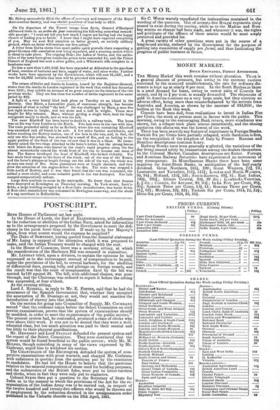POSTSCRIPT.
Bois Houses of Parliament sat last night.
In the House of Lords, the .Earl of 'Plr.T.nrsonounn, with reference to the reduction or abolition of the Indian Navy, asked for information as to the arrangements proposed by the Government to meet the defi- ciency in the naval force thus created. If made up by her Majesty's ships, from what source would the expense be supplied?
The Duke of SOMERSET, having quoted from the financial statement of Mr. Laing in support of the alteration which it was proposed to make, said the Indian Treasury would be charged with the cost.
In the House of Commons, there was a morning sitting, at which the consideration of the Harbours Bill was resumed in committee.
Mr. LINDSAY tried, upon a division, to sustain the opinions he had expressed as to the extravagant amount of compensation to be paid, under the provisions of the bill, to several harbours, for the abolition of differential dues, passing tolls, and pilotage on foreign vessels, and the result was that the scale of compensation fixed by the bill was carried by128 against 28. The bill, with additional clauses, was gone through, and the Chairman was ordered to report it before the sitting was suspended, at four o'clock.
At the evening sitting,
Lord J. RuttsFrt,, in reply to Mr. E. FOSTER, said that he had the assurances of the Spanish Government that, whether they accepted the annexation of St. Domingo or not, they would not sanction the introduction of slavery into that island. On the motion for going into Committee of Supply, Mr. COCHRLNE moved " that the evidence taken before the Select Qmamittee on civil service examinations, proves that the system of examinations should be modified, in order to meet the requirements of the public service." The present system had, he contended, produced a class of clerks who were above their work. It was not to be denied that they were a well- educated class, but too much attention was paid to their mental and too little to their physical qualifications. Mr. HENESSEY and Lord STANLEY defended the present system and the report of the Select Committee. They were convinced that the system would be found beneficial to the public service; while Mr. M. MILNE% though coinciding. in many of the views expressed by Mr. Cochrane, urged him to withdraw his motion. The CHANCELLOR of the Excnzgurat defended the system of com- petitive examinations with great warmth, and charged Mr. Cochrane with unfairness in quoting from the questions put by the examiners to candidates. He had led the House to believe that the questions relative to the mineral composition of stone used for building purposes, and the submersion of the British Isles, were put to lettercarriers and clerks, when in fact they were only put to engineers. Colonel SYKES then put a question to the Secretary of State for India as to the manner in which the provisions of the Act for the re- organization of the Indian Army was to be carried out, in respect of the twelve hundred and twenty-five officers who would be thrown out of employment by the reduction directed in the amalgamation order Published in the Calcutta Gazette on the 10th April, 1861. Sir C. WOOD warmly repudiated the insinuations contained in the wording of the question. Out of seventy-five Bengal regiments sixty ceased to exist during the mutiny, while as to the Madras and B3I11- bay armies no change had been made, and whenever it was, the rights and privileges of the officers of these armies would be most amply protected and provided for. A great variety of other questions were put in the course of a lengthened sitting, endured by the Government for the purpose of getting into committee of supply pro forma, and thus facilitating the progress of public business in future.






























 Previous page
Previous page